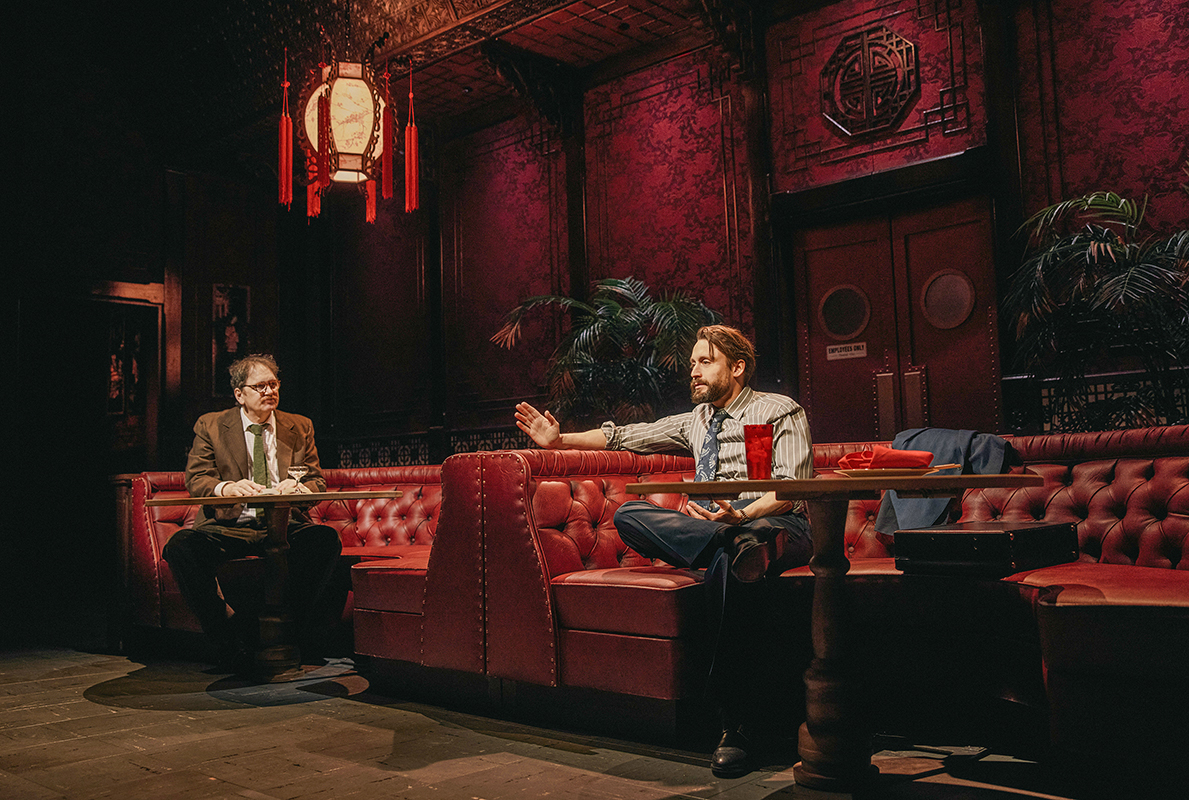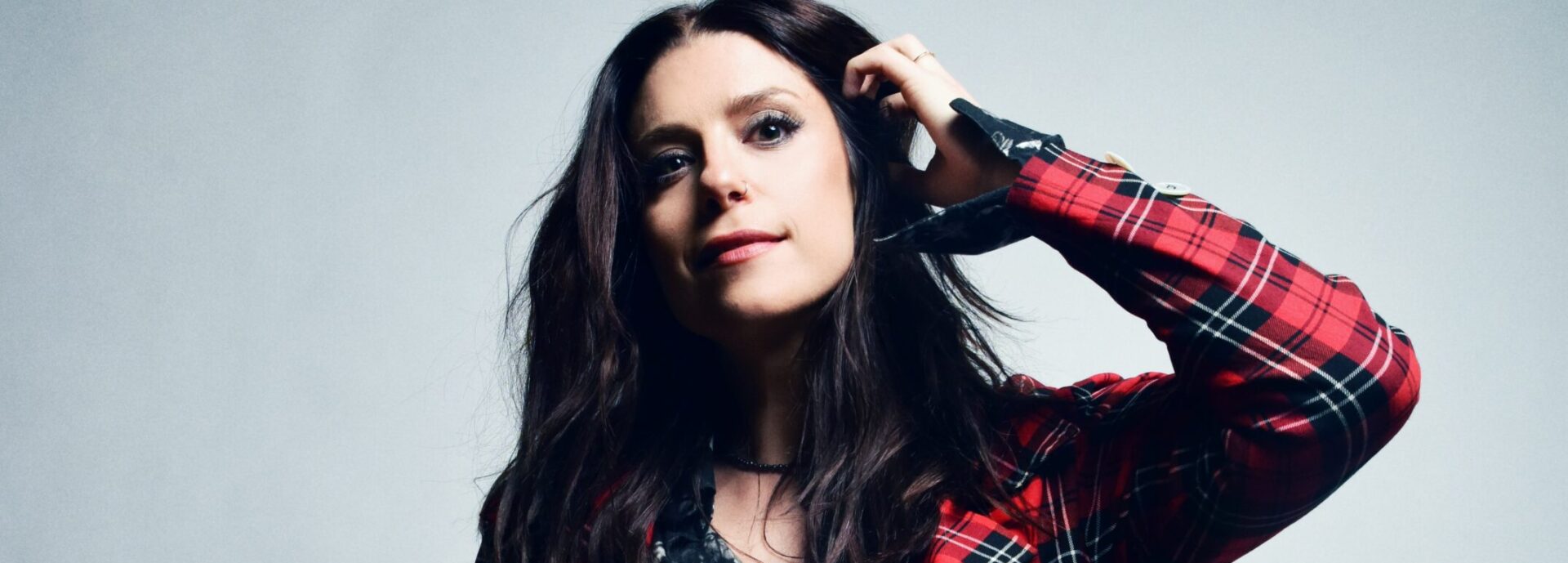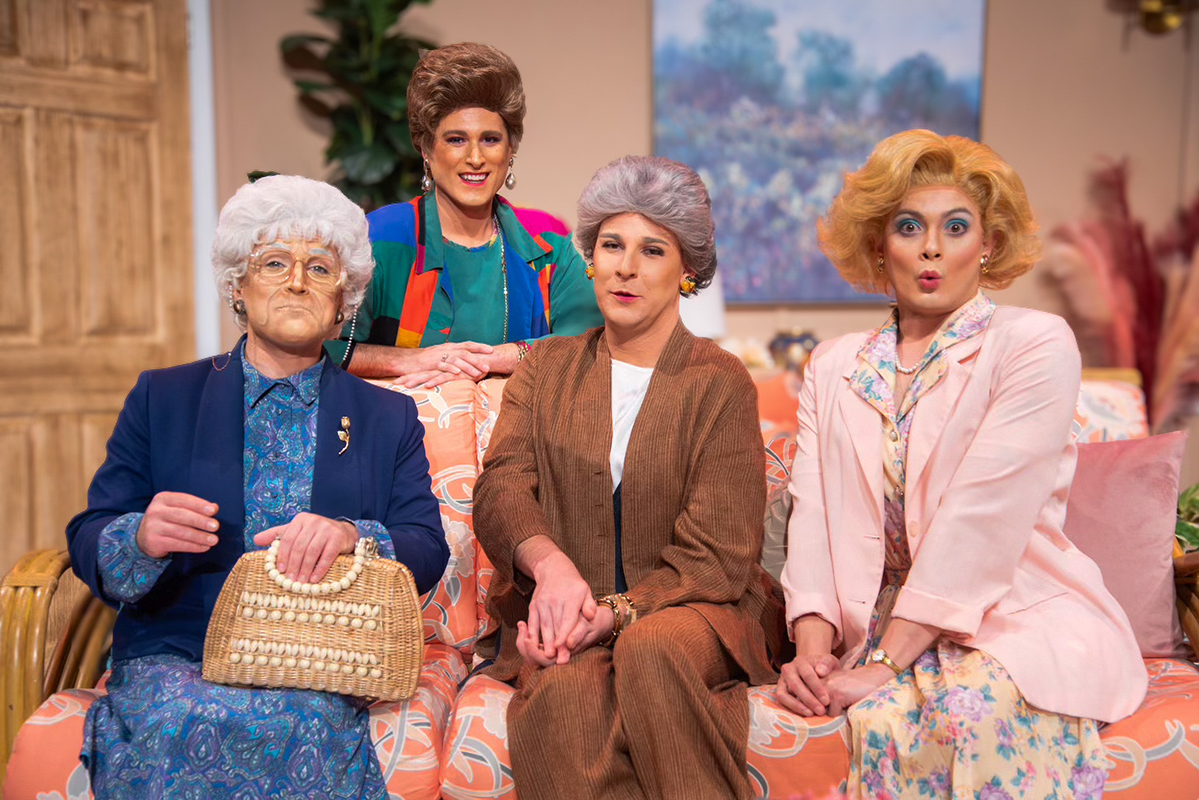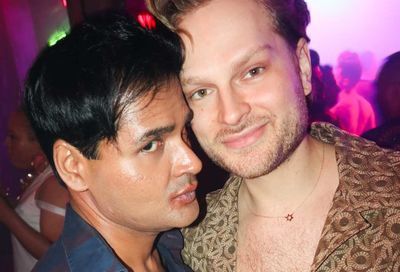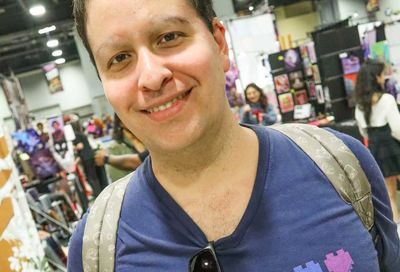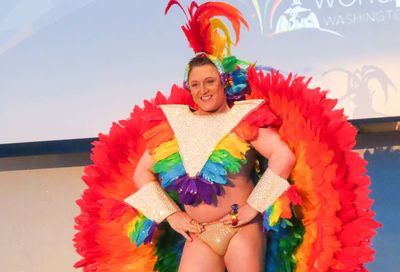Lypsinka Speaks!
Interview with John Epperson

To say that John Epperson is the “Pride of Mississippi” probably wouldn’t be the most accurate of statements.
Now, that’s not to disparage Epperson’s estimable talent. Fueled by the early-’80s avant-garde, pop-culture-recycling art scene in New York, where he migrated soon after finishing college in his native Mississippi, Epperson poured his creative energies into one of the more distinctive personas to emerge in contemporary performing arts: Lypsinka. Over the course of two decades, Epperson’s performances as Lypsinka have garnered international acclaim for elevating drag and lip-synching to a heady, mesmerizing realm where Epperson’s creation speaks only through intricately woven snippets of audio drawn from the vast expanse of American entertainment products.
The hometown crowd in the Deep South should be proud of Epperson’s accomplishments, and in their own way, he knows they are. But Epperson is realistically aware that the stigmatization of drag that kept him away from drag performance until after he settled in New York is still tangible to some degree in the Mississippi air. In spite of that, Epperson can boast of being well-received for Lypsinka performances in his college town, a triumph that was certainly no guarantee. And he’s even shared screen time with writer and fellow Mississippian John Grisham in an Emmy-winning Mississippi Public Television documentary program.
In a cool, dimly lit auditorium at The Studio Theatre, Epperson grabs a breather in the midst of a hectic schedule in Washington. Last week, he brought Lypsinka to the Capital Pride Street Festival mainstage before diving into rehearsals for a limited engagement of the show Lypsinka! The Boxed Set, now running at the Studio. With a bracing mix of candor and wit, he reflects on his life — both onstage and off — and what the future may hold for Lypsinka and himself.
MW: Do you go back to Mississippi often?
JOHN EPPERSON: My parents and sister still live there. I felt tied to it until about ’92, and then I realized, “This isn’t home anymore. New York is home.” I haven’t been back very much since then. I have a bit of guilt, but I also think, “You’ve grown up. You’ve moved past it.”
I was always like a changeling in my home. I was like this kid from outer space. I looked different from them. They don’t have strawberry blonde hair. My tastes in things were so sophisticated, even at an early age. I ponder this a lot. Why was I so fascinated by show business, when no one else in my family was? Why did I have musical and performing interests that no one else in my family had? I always felt like an alien with them.
MW: Are you close to your family?
EPPERSON: Yes, in a sort of Prince of Tides way. You know, the family that doesn’t talk about anything.
MW: Have they seen you perform much?
EPPERSON: They have, but whether or not they completely absorb it, I don’t know. I feel they can only appreciate it on one level. I think my show has many levels, and I function as a person on many levels. The rest of my family sort of functions on this one level they’re comfortable with.
MW: What can audiences expect from The Boxed Set?
EPPERSON: If you want to come and enjoy the show just as silly drag nonsense, you can. If you want to look deeper and see the notion of a person who feels trapped, that’s in there. If you want to look at it as a comment on performance — drag specifically — that’s also there. Many critics find the show to be a deconstruction of women’s roles in the entertainment business. I didn’t really intend it that way, but if you want to find that, great.
I did intend the show to be non-misogynistic. It’s so easy to do misogynistic drag humor. I deliberately tried to avoid that. A lot of women, when they see the show, feel liberated and empowered. It’s a transcendental thing for them. The show does take you on a sort of psychic journey through this person’s head, and it ends on a big, joyous high note. But it has some dark spots.
MW: Have you ever been accused of misogyny, or do you just think drag in general has that reputation?
EPPERSON: Drag gets that label. I know there are some women who’ve seen me perform and been horrified by what they saw — like it was setting the feminist movement back. Every person has their own perception. Gloria Steinem has seen me perform, and she said, “Well, it’s a send-up of everything my parents taught me. I love it.”
MW: The whole concept of “glamour” seems misogynistic sometimes. It can be torturous for many women to do all these things — hair, makeup, shoes, dresses — in order to be viewed as attractive by society.
EPPERSON: Glamour is ridiculous and fun at the same time. I hope my show emphasizes, “Isn’t this absurd? But isn’t it also a lot of fun?” Joan Collins can’t go out of the house without all of her drag on. Another woman may not. However, I was at Ziegfeld’s on Sunday night after the Capital Pride Festival, and I saw about six lesbians with no makeup on. They were stereotypical “diesel dykes” in t-shirts, and they were eating up those glamorous drag queens. They don’t want to get in it themselves, but they love looking at it. A performer in a bikini and pasties straddled this one bull dyke, and they went wild! I thought, “Well, yeah, she’s found what she’s wanted — a glamorous, dressed-up woman with a penis.” [Laughs.]
MW: How do you relate to other drag performers in New York and cities you visit? Is there a sense of camaraderie?
EPPERSON: The public perception is that drag performers are awful messes. There’s a part of me that separates myself from that, because I don’t want people to think I’m that way. I’m afraid they won’t hire me. It’s a matter of getting a job. I’ve tried to change the perception of me from being a club performer to being a theatre performer. The tricky thing is, I got started in clubs. But I am a bit of a separatist.
MW: There’s certainly a distinction to be made between performing in a venue like The Studio Theatre and lip-synching to a Celine Dion song for dollar bills in a bar. Do you see much crossover between those audiences?
EPPERSON: I hope people who would go to see [a club show] would come see me. Though word has trickled back to me, like, “Well, she didn’t change costumes enough.” But that’s not what it’s about.
MW: Where do you fall under the big GLBT umbrella? Does the “gay man” label work for you?
EPPERSON: I’m comfortable with that, but I see myself as bigger than gay. What I’m more interested in is individualism, which is disappearing like crazy. The fact that the gay community wants to assimilate themselves and be like straight people — they want to be in the military, they want to have kids — doesn’t interest me. I’m not the only one. I could name some very famous gay men I’ve discussed this with who feel like, “No, we don’t want to be part of that.” What happened to fun? What happened to the individualism?
Even the gay activist Vito Russo used to say, “You’re all going to miss all of this. You’re going to miss when being gay was mysterious, and something you had to hide.” When you had to hide it, there was more mystery and glamour to it. Now that’s disappearing. I’m not saying I want to hide. But I’m old enough to remember when Boys in the Band was really something.
MW: You’ve thrived on an aspect of the gay community that’s very fun- and glamour-loving.
EPPERSON: Indeed. I saw that Barbra Streisand and Bette Midler had made their careers by starting in gay clubs, and it became a bigger thing. So that’s what I set out to do.
MW: But you’ve seen the climate change over your twenty years of performing. Will you prosper indefinitely with a strong audience base?
EPPERSON: The great thing about places like The Studio Theatre is that they have a subscription base of all kinds of people. That’s exciting, because my audience is expanding. This has only really started happening since this show opened in New York [in September of 2000] and the Times peed all over it. Suddenly, everyone was coming. It wasn’t just the gay, fabulous crowd.
MW: One wants to be “peed on” by the New York Times?
EPPERSON: [Laughs.] Yes, it’s a good thing.
MW: Do you relate at all to transgender politics in the gay community?
EPPERSON: Transgender seems to be the new platform. Maybe that’s why The Washington Post seems to love a man in a dress so much lately. I see both sides to everything. There’s not a clear-cut side to anything in my opinion, and that’s been reinforced by September 11th, God knows.
MW: But where do gender issues come into your personal identity?
EPPERSON: They started really early with me. There’s home movie footage of me in a race with a cousin. It’s one of my earliest memories. I was a year older, and I won. Then I race my sister, who’s three years older. In the middle of the race, I stopped, because I saw she was winning. My father, sort of cruelly, followed me with the camera. I start crying, because I’ve lost the race, and I go into this little playhouse in our back yard. A few seconds later, you see me coming out of the playhouse, and I’ve put on women’s clothes I’ve found, and now I feel better. There’s a new way for me to get attention with my family. I’m dressed up, and I’m getting a whole new feeling about myself because they’re all looking at me.
I also saw the movie Gypsy when I was a kid, and I remember acting like Natalie Wood and being spanked for it. I was confused. One day, I’d get attention for it. The next day, I was being spanked for it.
MW: Was there a cut-off age at home between, “This is cute,” and “Okay, enough”?
EPPERSON: Around the age of fourteen, I said to myself, “You really have to get control of yourself in order to get through junior high and high school. You’re going to have to be as masculine as you possibly can,” which wasn’t easy. I built a protective shell for myself, like we all do, without realizing I was doing it, and somehow got through. When I got to college and saw my first drag show in a gay bar, it was totally frightening to me. I saw myself on that stage. I didn’t want to perform in Mississippi, though, because I knew there would be such a stigma attached to it. So I used things like Halloween and Mardi Gras as excuses to dress up, and I never performed in drag until I got to New York.
MW: If you don’t align with the gay political mainstream on issues like military and families, how do you feel about legal recognition of gay relationships?
EPPERSON: I understand why people want the legal benefits of marriage. It just doesn’t appeal to me to be married at all. The whole mythology of marriage needs to be changed. I like being a single person. At one time, I thought I wouldn’t like it. But now, maybe because I’ve been single for so long, the very idea of having to wake up and face someone else every day is so unappealing.
MW: Do you think the gay community’s energies would be better-focused elsewhere?
EPPERSON: I have to tell you, I’m not very much of a political person. I went to one Act-Up meeting in New York when it was very popular, and the rhetoric was confusing to me. I thought, “I don’t understand. I’m going to go back home and watch a Susan Hayward movie. That’s more gay to me.” You know, I once saw Cher and Chastity on Oprah. I could see that even Cher, with all of her gay friends, was still trying to come to terms with the fact that her daughter is a lesbian. I thought, “Deep down inside, even Cher doesn’t get it.”
Tolerance isn’t enough. Acceptance isn’t enough. Understanding may be enough. But I don’t know if you can understand unless you’re inside a person’s skin. What could be enough is just to somehow shed the fear and loathing, but the only way that can be done is if all the people who hate homosexuals realize there’s a potential homosexual lurking in them. Sexuality is a transitory thing that could shift at any moment. It’s bigger than all of us.
MW: Let’s talk a little more about The Boxed Set. Does all of the music and dialogue come from other media — films, television, records?
EPPERSON: Yes, I do not speak. The only thing actually made for the recording was a few lines done by Barbara Feldon, a pal of mine who was Agent 99 on Get Smart. She’s recorded a lot of things for me. She’s a great voice-over artist and does lots of commercials. At the end of this show, when Lypsinka is taking her curtain calls, she says, “Bless you, thank you, I love you!” And she does, “You like me, you really like me!” holding the Oscar. It’s not Sally Field, it’s Barbara Feldon.
MW: How much time goes into creating your recording?
EPPERSON: One reason this show is called The Boxed Set is because it’s like a greatest hits compilation. It’s bits and pieces of all the different Lypsinka shows, like a CD boxed set. It didn’t take that long to do it, but when you think back on all the years and all the different shows this one came from — plus there’s stuff I’ve had since I was a kid — you could actually say it took a lifetime to make.
MW: Lypsinka has a voice offstage — in things you’ve written for various publications and your website — that you don’t give her onstage because you stick to this lip-synching medium you’ve developed. Are those voices different?
EPPERSON: It sort of has to be two different voices. The written word isn’t the same as the “stolen word.” I’ve tried to write for my website in that over-the-top, Hollywood star manner, and make it subversive. But it’s like Lypsinka doesn’t even know she’s being subversive. Just like Pee-Wee Herman on Pee-Wee’s Playhouse. We knew Paul Reubens was being subversive, though it totally slipped past kids, of course, and the CBS executives had no idea what he was doing.
MW: Does Lypsinka ever appear offstage at parties or receptions, but talk in character?
EPPERSON: I’m not comfortable doing that very much, partly because I don’t feel the desire to exhibit myself at parties anymore like I used to. I’ve become more Greta Garbo-like in my old age. I like to do my work onstage, then go out to eat with friends instead of going to big shindigs.
MW: So you keep John and Lypsinka separate, and don’t have any trouble doing that?
EPPERSON: Yes, like there’s Dame Edna and Barry Humprhies, Pee-Wee Herman and Paul Reubens, or Elvira and Cassandra Peterson. I like being a man. I’ve had my share of gender identity crises, but I’ve also had my share of just identity crises, period. The desire to be “famous” was part of my identity search process. When I got that, I felt more at peace with myself. But I don’t feel the burning desire for fame anymore. I’ve discussed this with [alternative rock icon] Morrissey, and I told him, “I wanted to be famous, and I realize now it was a search for identity, and I got it. Now I play the fame game because it’s part of my job.” He said, “I feel the same way, and you and I aren’t the only ones.”
MW: What’s coming up when you do wrap up at Studio?
EPPERSON: I have my finger in lots of things. Another reason the show is called The Boxed Set is that I feel boxed in now by Lypsinka. I feel boxed in by lip-synching. Unfortunately, what happens to everyone in show business is that if they become well-known and successful for doing one thing, people think they can’t do anything else, or they don’t want them to do anything else. So I’ve spent the last few years trying to educate the public and people in the business that Lypsinka doesn’t necessarily have to lip-synch.
MW: Do you ever think about creating other personas, or performing out of drag?
EPPERSON: My character in a play we’re trying to get the rights to would be totally different from Lypsinka. But it would be a woman. Whether or not they’d need to use the name Lypsinka to sell it, because that’s better-known than the name John Epperson, I don’t know. But I have done some things as John Epperson. RuPaul and I made a movie together, Red Ribbon Blues, in ’95 that never got released, though it does pop up sometimes on HBO or Cinemax. We played boyfriends out of drag.
MW: It sounds like you’re really into broadening who Lypsinka is and what she does.
EPPERSON: And broadening definitions for myself, too.
Lypsinka! The Boxed Set is scheduled through June 30th in the Mead at The Studio Theatre, 14th and P Streets NW, though an extension is possible. Tickets are $23.50 to $43.50. Call 202-332-3300. Visit www.studiotheatre.org or www.lypsinka.com.
Support Metro Weekly’s Journalism
These are challenging times for news organizations. And yet it’s crucial we stay active and provide vital resources and information to both our local readers and the world. So won’t you please take a moment and consider supporting Metro Weekly with a membership? For as little as $5 a month, you can help ensure Metro Weekly magazine and MetroWeekly.com remain free, viable resources as we provide the best, most diverse, culturally-resonant LGBTQ coverage in both the D.C. region and around the world. Memberships come with exclusive perks and discounts, your own personal digital delivery of each week’s magazine (and an archive), access to our Member's Lounge when it launches this fall, and exclusive members-only items like Metro Weekly Membership Mugs and Tote Bags! Check out all our membership levels here and please join us today!




